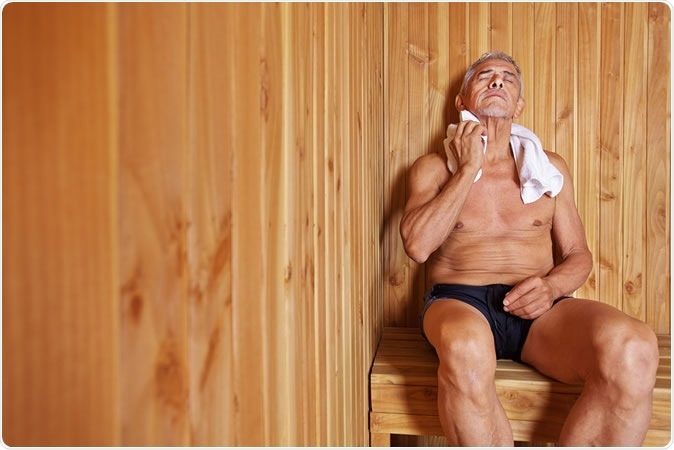Most people assume that their blood pressure falls after a sauna, which is why this is often thought of as relaxing. This may be true in the long-term, but during the sauna session itself, surprisingly, the blood pressure rises just as if you were having a short moderately strenuous workout, according to a new study. This increases the workload on the heart.
In new research, at the Martin Luther University Halle-Wittenberg (MLU) in collaboration with the Medical Center Berlin (MCB), 19 participants were sent first to a sauna for a 25-minute session. Their blood pressure and heart rate was measured both before and after the sauna bath, and during the 30-minute rest period that followed. Both parameters showed a steady rise above the baseline.

Research shows saunas induce as much physical strain as moderate exercise. Image Credit: Robert Kneschke
The second part of the study saw the volunteers completing a short session on an exercise bicycle while the blood pressure and heart rate measurements were repeated. This session was carried out on a separate day from the sauna visit. The exercise was estimated to put a load of about 100 watts on the body. The researchers observed the same level of increase in blood pressure and heart rate during both the sauna session and the bicycle exercise test. In effect, therefore, a sauna is also a short-term physical stressor for the body.
Conventional medical wisdom assumes that the heat experienced during a sauna visit causes the blood vessels to dilate, leading to a continuous reduction of blood pressure. For this reason, doctors advise those with cardiovascular problems or with already low blood pressure to keep away, to avoid the risk of fainting because of further decreases in the blood pressure.
This may not have been based on actual research, concludes the study. Dr Sascha Ketelhut, lead author, says, “it is important to distinguish between the acute effects of a sauna session and the effects that were noted during the rest period after the sauna session. Many previous assumptions have been made about the acute effects of sauna use, but so far little research has been done.”
The actual measurements showed that both systolic and diastolic blood pressure went up progressively and significantly, but then decreased to below the baseline after the sauna. The heart rate also showed a continuous rise during the sauna phase, resulting in higher oxygen consumption by the heart muscle. However, this also went down steadily following the sauna. The changes during the sauna bath were equivalent to the demands placed on the body by moderate exercise, of about 60-100 watts.
On the other hand, the short-term physical strain of a sauna visit, caused by heat exposure, is unlikely to do any harm, according to Ketelhut, if due caution is observed. She says, “Saunas can actually be used by anyone who can tolerate moderate physical stress without discomfort. However, people with low blood pressure should be cautious afterwards, as their blood pressure may then fall below the levels registered before the sauna visit.”
Earlier studies showed cardiovascular benefits with sauna use, but their measurements focused on the long-term physical changes. Indeed, following the sauna, the study participants had a lower heart rate and blood pressure than at baseline. The current study shows that these positive effects are equivalent to those induced by moderate exercise, and are indeed attributable to the physical effects produced during the sauna.
However, the profuse sweating that occurs during a sauna session is not an important cause of weight loss, as only fluids are removed from the body. In fact, these need to be replaced as early as possible. Ketelhut comments on the sweating: “The effect is too low as there is no muscle activity. Although we lose weight in the sauna, but these are just the fluids that we sweat out. One should rehydrate after a sauna session, though."
The study was recently published in the international journal Complementary Therapies in Medicine.